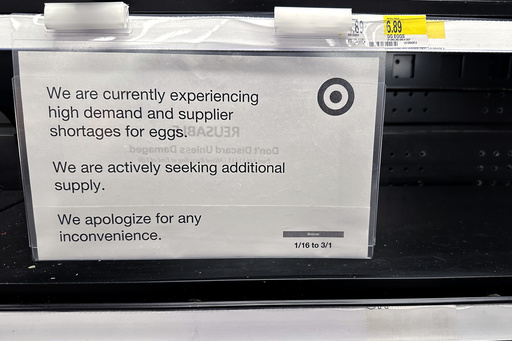
Egg prices have soared to new heights amid an ongoing bird flu outbreak, making them not just costly but increasingly difficult to find. Many stores are now imposing limits on egg purchases as the situation escalates. This spike in demand has even led to criminal acts, with thieves treating eggs like precious commodities in recent robberies.
The avian flu continues to mutate, impacting a variety of birds and even some other animals and humans. Whenever a chicken or turkey becomes infected, the entire flock is often culled to curb the virus’s spread. Due to these ongoing issues, predicting when and where a major poultry farm with millions of birds will be affected is nearly impossible. A single outbreak can lead to significant supply failures, feeding the inflation of prices.
Consequently, prices have skyrocketed. Local bakery owner Jose Castillo of Norma’s Sweets Bakery in New Orleans lamented the rising costs, expressing that he’s now paying nearly four times more for eggs compared to previous prices. “It’s painful, man. The expense of eggs is outrageous,” shared Castillo. He noted that while they used to purchase eggs at $35 to $40 per case, they are now shelling out about $118 to $120.
Finding eggs has become a challenge for consumers across the nation, prompting many to visit multiple stores or reach out to local farms. Since the onset of this outbreak in 2022, approximately 158 million birds have been culled, predominantly affecting egg-laying hens. With a national population of over 300 million laying hens, the industry can usually absorb some losses. However, when significant numbers are affected—as seen with the culling of 23 million birds last month following December’s 18 million—the effects on egg supply become acute.
In response to the dwindling supply, some retailers have begun implementing purchase limits. Trader Joe’s has announced a restriction of one carton per customer per day at all of its locations. The company hopes that these limitations will enable more customers to find the eggs they need. Other chains like Costco, Whole Foods, Kroger, and Aldi have also been observed adopting various limits, although such measures may not be universal across all regions.
Kroger representatives indicated that while there are no company-wide limits, some specific stores may limit customers to two dozen eggs per visit. Meanwhile, Walmart noted that they haven’t set nationwide limits besides restricting the purchase of larger 60-count cartons to two per customer. The company confirmed its commitment to work with suppliers to meet customer demand while keeping prices manageable.
While the average price of eggs reached $4.15 per dozen in December—seeing a dramatic increase from summer prices—there’s little hope for immediate relief. Analysts predict prices might climb an additional 20% due to rising demand as Easter approaches. Even though the average price is on the rise, many consumers are already facing costs exceeding $10 for a dozen, particularly for organic or cage-free eggs.
Restaurants are also feeling the pinch. Recently, Waffle House announced a 50-cent surcharge for each egg served in its dishes.
With the prices escalating, it’s no surprise that egg thefts have become a concern. Police in Seattle are investigating the theft of over 500 eggs from a café, where security footage showed two men loading stolen goods into a van, which also included other breakfast items. Additionally, in Pennsylvania, a staggering 100,000 eggs were reported stolen from a distribution trailer, valued at about $40,000.
As the egg situation continues to unfold, it’s clear that both consumers and businesses are facing unprecedented challenges.

